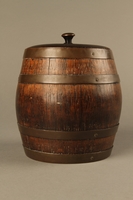Overview
- Brief Narrative
- Oorlogsherinneringskruis [Commemorative War Cross] medal awarded to Jack Grootkerk, a Dutch Jewish soldier in the Prinses Irene Brigade, Dutch Free Forces, from September 1942 to September 1945. The honorary medal was presented to all Brigade members who landed at Normandy in 1944. The Brigade was formed in England in 1941 by the Dutch government in exile and Dutch Army personnel. The unit wore British battledress uniforms with Dutch insignia. On May 10, 1940, Germany invaded the Netherlands. In December 1941, Jack was told to report for forced labor in Germany. He and his brother Erich fled to France and Spain, and were interned several times. In fall 1942, they reached Great Britain and Jack joined the Brigade. In July 1944, the Brigade entered combat in Normandy. The Netherlands was liberated on May 5, 1945. Most of Jack and his wife Hedi’s family were killed in German concentration camps.
- Date
-
commemoration:
after 1940 May-1945
manufacture: after 1948
- Geography
-
manufacture:
Voorschoten (Netherlands)
manufacture: Breda (Netherlands)
- Credit Line
- United States Holocaust Memorial Museum Collection, Gift of Paul Grootkerk and the Estate of Paul Grootkerk
- Markings
- medal, front, center, embossed : VOOR KRIJGSVERRICHTINGEN [for war operations]
ribbon, front, top bar, embossed : KRIJG TE LAND 1940 – 1945 [Get Land]
ribbon, front, bottom bar, embossed : NORMANDIE 1944 [Normandy]
medal, back, center, embossed : KON. BEGEER / VOORSCHOTEN / F.S.INV. [(Koninklijke Begeer) Royal Begeer / Frans Smits]
ribbon, back, embroidered, yellow thread : FA. A. TACH / BREDA [manufacturer’s mark] - Contributor
-
Subject:
Jack Grootkerk
Manufacturer: Koninklijke Begeer
Manufacturer: FA. A. TACH
Designer: Frans Smits
- Biography
-
Jacques Grootkerk was born on July 25, 1913, in Amsterdam, Netherlands, to Izak (Isaac) and Pauline Servos Grootkerk. Izak was born on October 31, 1882, to Jacob and Sofiah Grootkerk, a middle class Jewish family that had been in the Netherlands for many generations. He was a fabric merchant in Amsterdam. Pauline was born on January 27, 1885, in Germany, to Salomon and Regina Liman Servos. Jacques had one younger brother Erich, born on November 30, 1919, in Amsterdam. The family was not religious. On March 6, 1940, Jacques married Hedwig (Hedi) Justus, a Jewish refugee who had fled to the Netherlands in 1934. Hedi was born on February 27, 1918, in Nieder-Ohmen, Germany, to Juda (1878-1923) and Klara Wertheim (1881-1943) Justus. Hedi had 5 siblings: Julius, Herman (Herbert), Bertha, Rosa (Ruth), and Ludwig. By early 1940, three of Hedi’s siblings, Ludwig, Ruth, and Julius, had emigrated.
In May 1940, Germany invaded the Netherlands, Belgium, Luxembourg, and France. The Nazi occupied government implemented anti-Semitic legislation restricting the rights of Jews and created laws to punish anyone helping Jews hide or escape. By January 1941, all Jews had to register with the authorities. Jacques was summoned by the Jewish committee for a forced work placement in Germany, and he fled. Jacques and Erich left Amsterdam on December 3, 1941. They biked to Antwerp and were caught crossing the French border. They were released and walked to Maubeuge, France. The brothers travelled south, through German patrolled zones, to Paris. Sympathetic family friends there helped Jacques and Erich find people who could get them to Vichy France. They went to Tours and met with men who told them to cross the bridge during the changing of the German guards. They continued to Loches on foot. Once they arrived, a French detective found them and threatened to arrest them. The next day, the detective explained that he was a counter-intelligence officer and wanted to help. He bought them train tickets to Toulouse, where the brothers joined a group of Dutch refugees waiting to go to Curacao in the Dutch West Indies.
In February 1942, tired of waiting, Jacques and Erich decided to cross the Pyrenees Mountains into Spain. A winter crossing was too difficult, so they went to Lyon. They were caught crossing the Swiss border, and transported to a camp for foreign workers in Annecy, France. After two weeks, Jacques, Erich, Van Crefelt, and a Spaniard escaped. The Spaniard stole their money and bags, but Jacques, Erich, and Van Crefelt crossed the mountains. They made up fake British identifies and rehearsed background stories. They were arrested in Figueras, Spain, and sent to a prison near Barcelona. After a typhus outbreak, they were quarantined in the prison and barely fed. Erich contracted tuberculosis. After three months, Jacques, Erich, and Van Crefelt were transported to Miranda de Ebro concentration camp in northeastern Spain. There was little food and Jacques had dysentery. Jacques, under the name D. Ritmeester, began exchanging letters with his wife Hedi in France. On March 6, 1942, Hedi and her brother Herbert had escaped Amsterdam and followed the same route taken by Jacques and Erich. Hedi and Herbert arrived in Vichy France after Jacques and Erich had left. They did not want to cross the mountains, and stayed in France.
In late July 1942, Jacques, Erich, and Van Crefelt were allowed to leave under the protection of the British. They travelled to southern Spain and sailed to Ireland in late August. The British military gave Jacques, Erich, and Van Crefelt tickets to Wolverhampton, England, where the Dutch government in exile had established the Dutch Free Forces. The Forces consisted of Dutch soldiers and male citizens between 20 and 35 who had escaped to Great Britain following the German invasion. In August, all Dutch men living in Canada, Ireland, and the United States were called up for service. The Forces fought as part of the British army. Jacques joined the heavy machine gun section in the Prinses Irene Brigade, Erich became a paratrooper, and Van Crefelt a commando. Queen Wilhemina of the Netherlands visited the camp and presented a medal to those who had escaped from the Netherlands. Jacques asked the queen for a British visa for Hedi and Herbert, who had gone to Switzerland in September. They received the visa, but it was too dangerous for them to leave. Jacques began using the nickname Jack. In 1943, Erich married an Austrian refugee, Lissy. In late summer 1944, Jack’s Brigade landed in Normandy and moved north towards Belgium. In September, his brigade participated in Operation Market Garden. By March 1945, the Brigade had liberated much of the southern part of the Netherlands. In April, Jack and Hedi were reunited at the Gare de Lyons railroad station in Paris. Jack had to return to the front, and Hedi was not allowed on the military train with him. Two soldiers that knew Jack helped them board the train and hid Hedi. From Antwerp, Jack and Hedi walked to the Dutch border. Hedi had trouble crossing the border because she was a civilian, but another Dutchmen helped get them past the guards. Jack returned to the front and Hedi stayed with friends. Shortly after Jack’s return, the Brigade mobilized northward toward Amsterdam.
On May 7, 1945, Germany surrendered. Jack’s brigade was quartered in the Hague. The following month, the Prinses Irene Brigade entered Amsterdam as part of a liberation parade. Hedi joined Jack in Amsterdam in the summer. In September, Jack was demobilized. The couple had a son, Paul (1946-2015). Jack and Hedi learned that most of their extended family was killed during the Holocaust. Jack’s parents, Pauline and Izak, were sent to Westerbork transit camp and then deported and killed in Sobibor killing center on June 4, 1943. Hedi’s mother, Klara, was sent to Vught and Westerbork transit camps and then deported and killed at Auschwitz concentration camp on February 5, 1943. Hedi’s sister Bertha Stern was killed in Minsk, Poland, in 1943. Erich and his wife Lissy tried to immigrate to Palestine, but were detained in Cyprus. In 1948, the State of Israel was established and they settled in Regba. In September 1952, Jack, Hedi, and Paul sailed on the S.S. Zuiderkruis to the US. Hedi, 74, died on May 15, 1992, in Palm Beach, Florida. Jack, 85, died on March 26, 1999, in Palm Beach.
Physical Details
- Language
- Dutch
- Classification
-
Military Insignia
- Category
-
Medals
- Object Type
-
Medals, Dutch (lcsh)
- Physical Description
- Equilateral cross shaped, bronze medal attached to a ribbon backer. Embossed on the front is a woman, Queen Wilhelmina, in left profile surrounded by a band of Dutch text encircled by an oak leaf wreath. A W is embossed at the end of each arm. At the top of the upper arm is a semi-circular loop attaching the ribbon. The ribbon has 3 vertical stripes: green, wide orange, green. The ribbon is pleated at the bottom and folded upwards, creating a rounded bottom and a double width ribbon. Two flat plates with rounded ends and Dutch text are attached to the top of the ribbon. A tapered, green cloth covered cardboard panel with 2 metal brads is attached to the back.
- Dimensions
- overall: Height: 3.125 inches (7.938 cm) | Width: 2.000 inches (5.08 cm) | Depth: 0.375 inches (0.953 cm)
- Materials
- overall : bronze, ribbon, cardboard, thread
Rights & Restrictions
- Conditions on Access
- No restrictions on access
- Conditions on Use
- No restrictions on use
Keywords & Subjects
- Topical Term
- Jewish refugees--Great Britain--Biography. Jewish soldiers--Netherlands--Biography. Refugees--Dutch--Great Britain--Biography. Soldiers--Netherlands--Biography. World War, 1939-1945--Participation, Jewish. World War, 1939-1945--Personal narratives, Dutch.
- Corporate Name
- Netherlands. Army. Princess Irene Brigade
Administrative Notes
- Legal Status
- Permanent Collection
- Provenance
- The Dutch medal was donated to the United States Holocaust Memorial Museum in 2002 by Paul Grootkerk, the son of Jack Grootkerk.
- Funding Note
- The cataloging of this artifact has been supported by a grant from the Conference on Jewish Material Claims Against Germany.
- Record last modified:
- 2023-08-31 14:31:39
- This page:
- https://collections.ushmm.org/search/catalog/irn47132
Download & Licensing
In-Person Research
- By Appointment
- Request 21 Days in Advance of Visit
- Plan a Research Visit
- Request to See This Object
Contact Us
Also in Jack and Hedi Justus Grootkerk family collection
The collection consists of military uniforms, medals, ribbons, and pins, correspondence, documents, photographs, and publications relating to the experiences of Jacques (later Jack) and his family in the Netherlands before and during the Holocaust and his escape to Great Britain and military service during the war, as well as the experiences of Hedi Justus Grootkerk and her family in the Netherlands before and during the Holocaust, her escape to France and Switzerland during the war, and in the United States with her husband Jack after the war. Accretion: Artifacts and photographs illustrating the pre-war life of the Grootkerk family. Included are nameplate [I. Grootkerk] from 67 Achillestraat in Amsterdam, Netherlands, Izak and Paula's [donor's grandparents] residence, two napkin rings engraved "Izak" and "Paula", humidor and cigarette box, photographs include images of Izak, Paula, and their son Jacques, their daughter-in-law Hedi [Paul's parents], Fredrick Servos [Jewish-German friend of Jacques who visited family in Amsterdam]. Also included are two small images of engagement party for Jacques and Hedi Grootkerk, 1938, in the Netherlands, Jacques amd Hedi's wedding dinner in which Izak and Paula's son Eric is seen as well as Hedi's mother, Klara Justus-Wertheim and Hedi's brother, Herbert Justus both of who did not survive. Also included are three pre-war pins or medals worn by Jacques Grootkerk on his military uniform while a member of the Princess Irene Brigade in 1942. Some of these materials may be combined into a single collection in the future.
Date: approximately 1930-approximately 1951
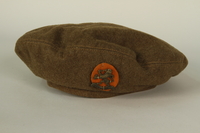
Military blouse, trousers, and General Service Cap worn by a Dutch Jewish corporal in the Prinses Irene Brigade
Object
Military blouse, pants, and General Service Cap worn by Jack Grootkerk, 29, who served in the Dutch Free Forces, Prinses Irene Brigade from September 1942 to September 1945. The Brigade was formed in England in 1941 by the Dutch government in exile and Dutch Army personnel who had escaped German occupied Europe. The unit wore British battledress uniforms with Dutch insignia. On May 10, 1940, Germany invaded the Netherlands. In December 1941, Jack was told to report for forced labor in Germany. He and his brother Erich fled to France and Spain, and were interned several times. In fall 1942, they reached Great Britain and Jack joined the Brigade. In July 1944, the Brigade entered combat in Normandy. The Netherlands was liberated on May 5, 1945. Most of Jack and his wife Hedi’s family were killed in German concentration camps.
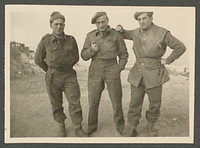
Grootkerk family papers
Document
The Grootkerk family papers consist of biographical materials, correspondence, personal narratives, photographs, and printed materials documenting Jacques and Hedi Grootkerk’s marriage in Amsterdam, Jacques’ flight to England via Spain and service in the Princess Irene Brigade, and Hedi’s flight to Switzerland via France. The bulk of the collection is comprised of love letters between Jacques and Hedi while they were separated during the war. Biographical materials include identification papers, ration books, military papers, and receipts documenting Jacques and Hedi Grootkerk’s refugee status, Jacques’ time in England, his military service, and his military decorations. The two correspondence series primarily consists of letters and telegrams between Jacques and Hedi during the war, some of which were transmitted via Jacques’ uncle Abraham Leuw. These series also include Leuw’s letters to Jacques and Hedi, correspondence from Jacques’ parents and brother and from Hedi’s siblings, and official correspondence to Jacques in England and Hedi in Switzerland regarding their refugee status and his military service. Personal narratives include Erich Grootkerk’s Onze Weg naar Engeland; Jacques Grootkerk’s untitled essay about his flight from the Netherlands, journey through Belgium, France, Spain, and England, and his military service in the Princess Irene Brigade; and notes and essays about the brothers’ refugee experiences, including a talk on “Impressions of England” Jacques prepared for the British Broadcasting Corporation. Photographs depict Jacques and Hedi individually, together, with family members, and with the Princess Irene Brigade in the Netherlands, Switzerland, and France. Printed materials include a set of photo postcards documenting the German surrender, a booklet documenting the Princess Irene Brigade, and souvenirs from Jacques’ time in England including a bus map, lecture and dance tickets, postcard, and laundry tag.
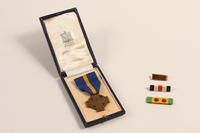
Cross of Merit medal, ribbons, and pins awarded to a Dutch Jewish soldier, Prinses Irene Brigade
Object
Kruis van Verdienste [Cross of Merit] medal, ribbon, and presentation box, two ribbon bars, and a gold bar pin awarded to Jack Grootkerk, a Dutch Jewish soldier in the Prinses Irene Brigade, Dutch Free Forces from September 1942 to September 1945. The Brigade was formed in England in 1941 by the Dutch government in exile and Dutch Army personnel. The unit wore British battledress uniforms with Dutch insignia. On May 10, 1940, Germany invaded the Netherlands. In December 1941, Jack was told to report for forced labor in Germany. He and his brother Erich fled to France and Spain, and were interned several times. In fall 1942, they reached Great Britain and Jack joined the Brigade. In July 1944, the Brigade entered combat in Normandy. The Netherlands was liberated on May 5, 1945. Most of Jack and his wife Hedi’s family were killed in German concentration camps.
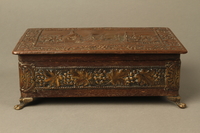
Wood and metal cigarette box
Object
Wooden cigarette box with pressed metal hinged lid decorated with city scenes, and a pressed metal floral border around the sides.
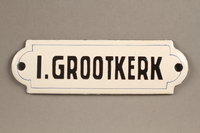
Metal nameplate
Object
White painted metal with "I. Grootkerk" painted in black capital letters. The nameplate was from 67 Achillestraat in Amsterdam.
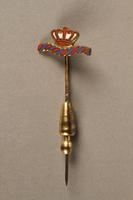
Stickpin
Object
Stickpin worn by Jacques Grootkerk on his military uniform while a member of the Princess Irene Brigade in 1942. The pin has a red crown and length of red and blue rope.
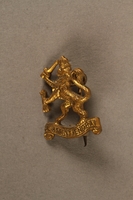
Pin
Object
Pin worn by Jacques Grootkerk on his military uniform while a member of the Princess Irene Brigade in 1942. The pin depicts a lion.
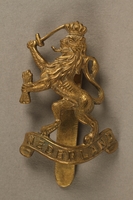
Clip
Object
Clip worn by Jacques Grootkerk on his military uniform while a member of the Princess Irene Brigade in 1942. The pin depicts a lion and the word Nederland.
Pair of engraved napkin rings
Object
Pair of metal napkin rings; one engraved with the name "Izak" and the other with the name "Paula", the names of Paul Grootkerk's grandparents.

